Wobsters
Worry
and
Wobble:
a book about
caring for your mind
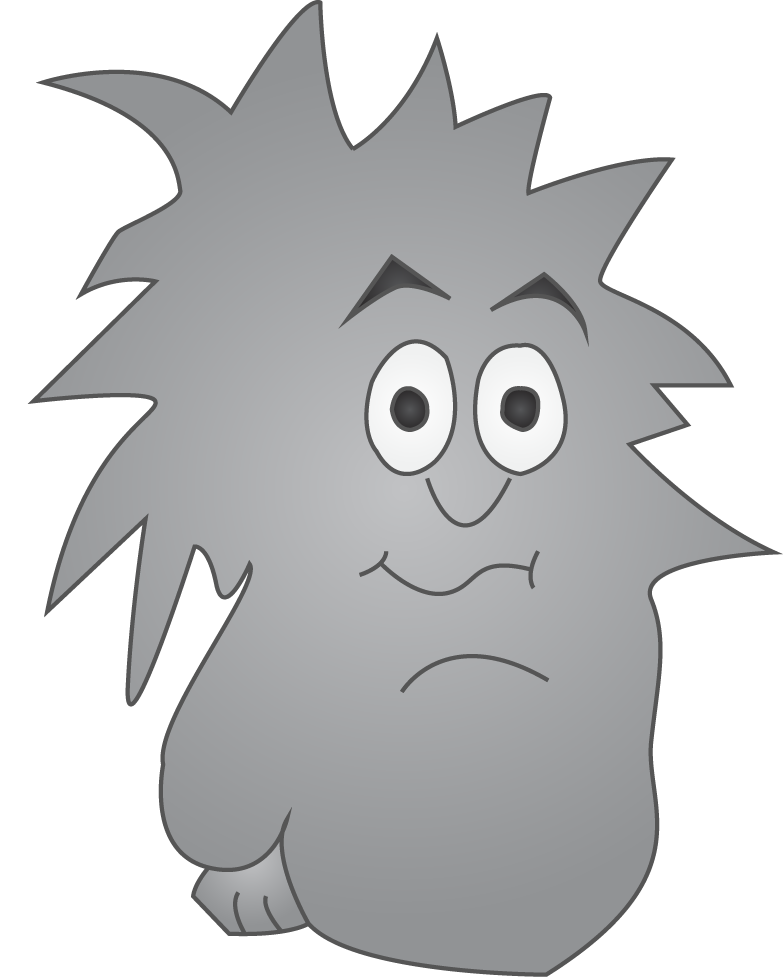
Outpost Oops
Worrying
Everyone has a wobster. A wobster is the part of us who worries. When wobsters worry a lot, they wobble, or tremble. Worrying a little can be a helpful warning, but doing so a lot can keep us from enjoying life.
This book will help you understand why people worry and how to worry less. It’s meant to be reread, especially during times you’re confused or upset. Share your thoughts about what you read with others. Wobbles, a make-believe gray wobster, offers helpful reminders.
Something New
People learn to care for their body. How to keep clean is one thing we learn. Washing helps us not get sick, right?
We also learn to care for our mind. That might sound odd. After all, people seldom talk about such care. That you care for your mind is something new to know. Give yourself time to get used to learning about it.
Giving your mind good care helps you be calm and content. By helping you worry less, good care makes relaxing and having fun easier.
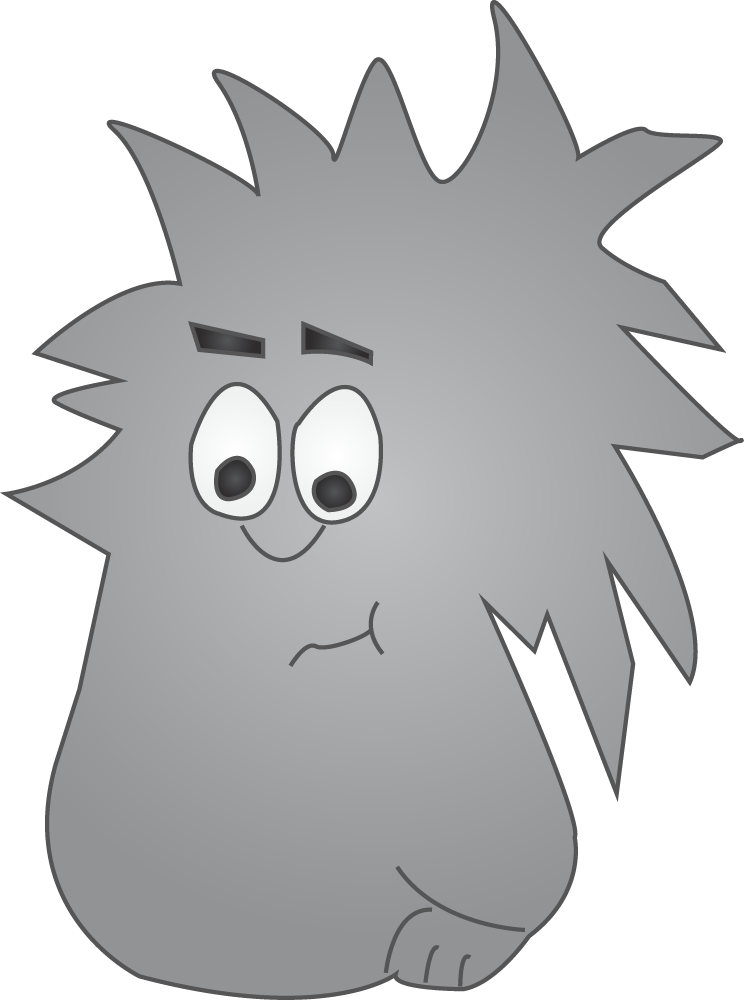
Genes
You know some things about your mind, or brain. You know it’s in your head and you know it’s where you wonder about the world.
You may also know genes help give you a mind. Your genes come from the woman and man who made you. Genes are so tiny that a powerful microscope is needed to see them.
Genes tell your body how to grow. That includes your mind. So, genes help make you the person you are.
Learning
Along with genes, what you learn helps make you who you are. You learn much from the world. The world includes relatives, school, friends, computers, TV, books and all that happens to you.
Learning to be nice is special. You learn to be nice when you see people be kind and fair to each other. You also learn niceness when others are kind and fair to you. Having others be nice to you helps your wobster worry and wobble less.
Learning to be nice takes a lot of practice. For now, know that you’re nice when you’re kind and fair. Also, know that you’re doing a good job caring for your mind when you give and get niceness.

Getting Ahead
People sometimes think being nice isn’t helpful. We think this because we learn there are times we should make getting ahead more important than being nice. Wanting to get ahead can cause our wobster to worry and wobble. Sometimes, her or his worrying and wobbling can cause us to think it’s OK not to be kind or fair.
But when niceness matters most to us, we seek to help out rather than outdo others. We also strive to trust others will be nice to us if we’re nice to them. That helps others and us feel calm and safe.
Stay Nice
Being nice doesn’t always get others to be nice back. So, how should you treat others when they’re not nice? The answer is you should stay nice. Don’t let others keep you from staying kind and fair. Remember, being nice is usually a super way to be calm and safe. It also lets you like yourself! Again, you’re taking good care of your mind when you’re nice.
Staying nice doesn’t mean you should let yourself feel unsafe. No one should keep you from feeling safe. If someone won’t stop being unkind or unfair, spending little or no time around her or him may be best. If someone is scaring you, seek help until you feel safe.
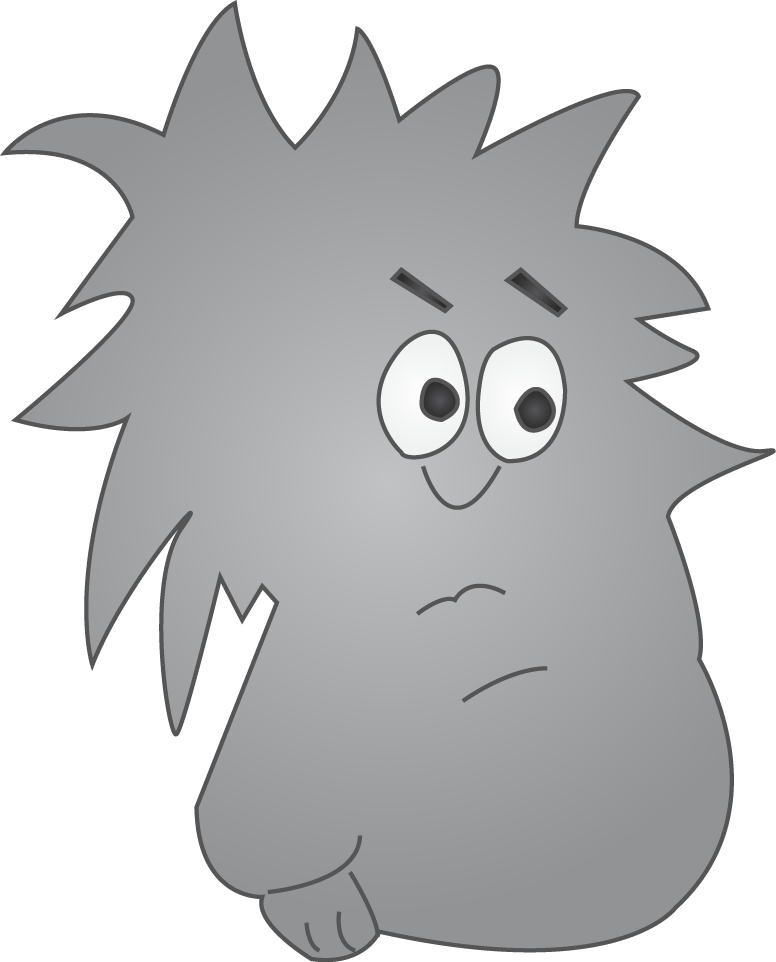
Hurt and Needs
Hurt isn’t pleasant. That’s because it happens when we lose something we need. Everybody’s mind needs two things: It needs to feel close to someone or something, and it needs to feel able to succeed at some of the things we do.
Because we need to feel close and able, losing them often hurts. Losing a friend we were close to always hurts. Losing a skill we made important also always hurts.
Again, everybody needs to feel close and able. We spend much of each day making sure we feel them. Learning good ways to feel close and able lets us care well for our mind.
Healing
We heal our hurt when we find and use good ways to have enough closeness and ableness. That doesn’t mean we have to get back the person or thing we lost. We only need to replace feeling close or able.
If you miss someone who’s moved far away, you can heal your hurt by finding another way to feel close. For example, you could join a team or club.
If you miss doing well in a school subject because it became too hard, you can heal your hurt by finding another way to feel able. For example, you could take up a hobby.
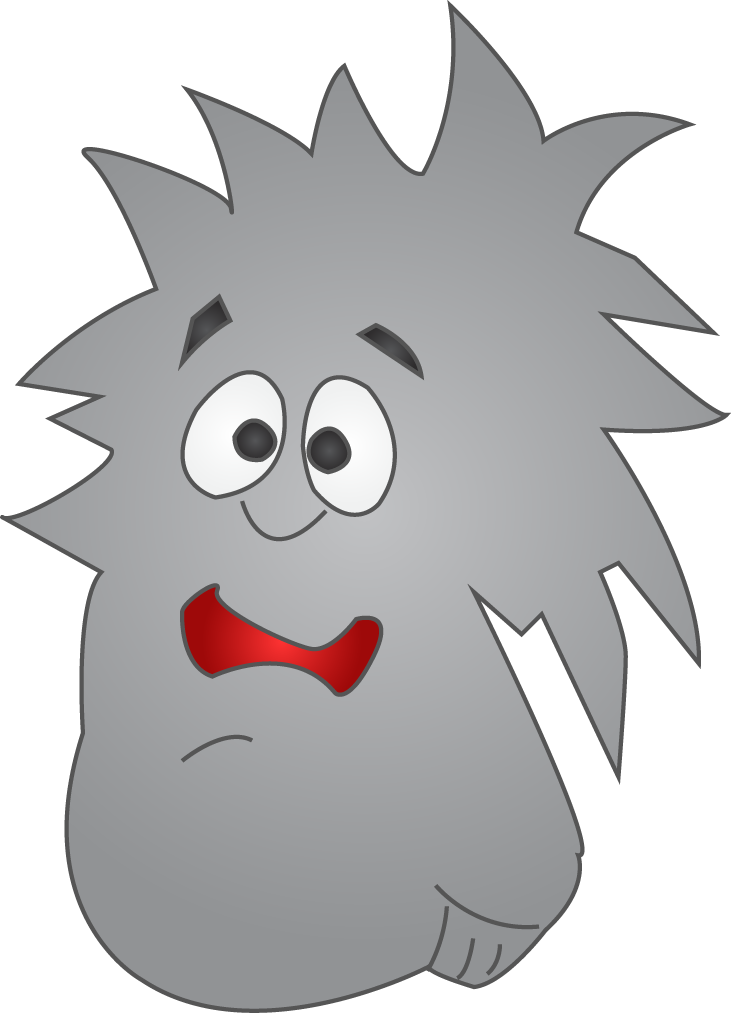
Mistakes
People sometimes lose feeling good about themselves when they make a mistake. Often, that’s because they don’t keep in mind how usual mistakes are. Mistakes don’t make people not good enough. They just make us human.
It’s also important to know mistakes, or mess-ups, are useful. They help us by showing us what not to do. Mistakes are never a good reason to feel like a failure. They’re only a reason to try to do better or to try something else.
Too Important
Everybody sometimes wants someone or something too much. We do this by making the person or thing we want too important. Sometimes we make a certain friend or toy too important. Other times we make doing well at something, such as a sport or craft, too important.
You’ve made a person or thing too important when failing to get or keep either causes your hurt to stick around. Your hurt sticks around because you think you have to have what you can’t have and don’t need. Remember, it’s feeling close and able that you need, not a certain way of getting them.

Storing
We sometimes hide our hurt. We do so because we’ve wrongly learned having hurt makes us weak, or wimpy. Because no one wants to feel or look like a wimp, everyone has times when she or he hides hurt.
Does our hurt fade away when we hide it? The answer is no! Hiding our hurt doesn’t make it disappear. Instead, our hurt gets stored in our mind as memories. Hurt memories can last a long time. Old people have hurt memories they stored in childhood.
Sad and Angry
When we store rather than learn from and heal our hurt, our wobster worries and wobbles more. That’s because we haven’t figured out better ways to feel close and able. Instead, we’ve continued to sometimes use hurtful ways that are unkind or unfair. When we continue to use hurtful not-nice ways, we get and store more hurt and we become sad and angry. The more hurt we store, the more sadness and anger we have.
Becoming sad and angry makes things worse. Getting close to others becomes harder, because others don’t want to be around us. They’re likely to see us as gloomy or grouchy. Feeling able to do things also becomes harder, because feeling down or upset leaves us weary.
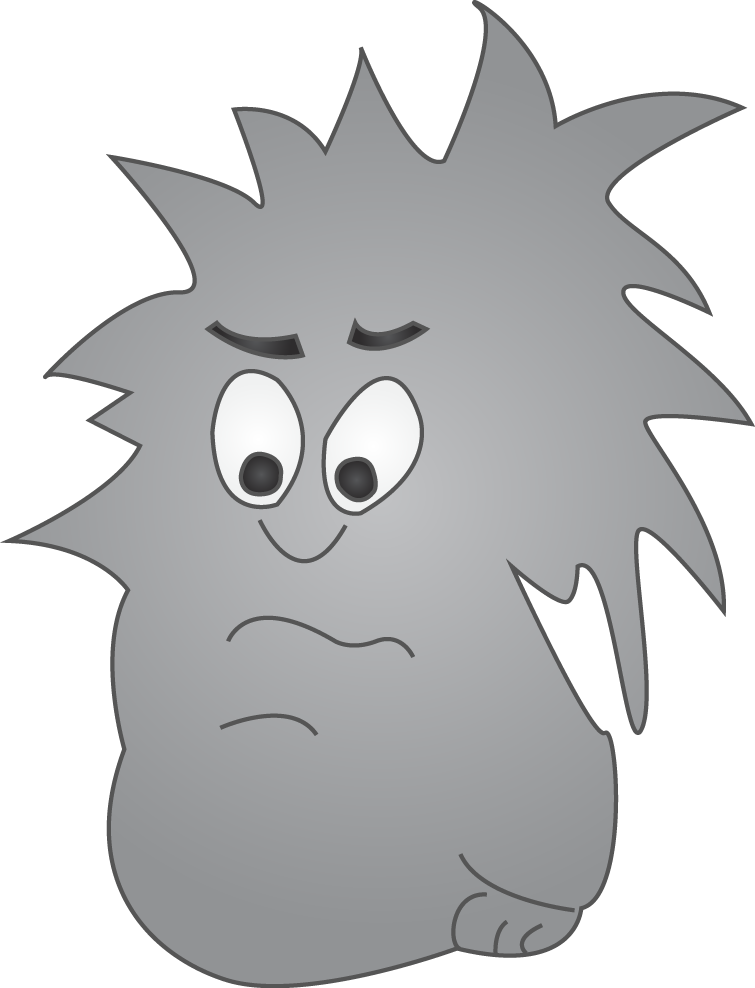
Healing Can Take Time
It can take time to heal, or get over, our hurt. This is so when we lose someone close to us. It’s also sometimes so when we lose feeling able to get better at something. When we incorrectly think we can’t enjoy life without a certain someone or without doing a certain something, it can take a long time to heal.
Hurt is also hard to heal when we think a hurtful mistake proves we don’t deserve to heal. To heal, we must realize hurtful mistakes are a chance to learn how to become a nicer person. By working at becoming a kinder and fairer person, we give ourselves a good reason to feel we deserve to heal.
Becoming Nicer
No one is nice all the time. To always be nice, people would have to always feel safe. Everyone gets scared. There are too many unkind and unfair things that happen to us and around us. When scary stuff happens, our wobster worries and wobbles more. In turn, we may think being nice will allow others to take advantage of us.
We can’t always be nice, but we can always strive to nicer. We can do so by learning from and by healing our hurt. Less hurt means less worrying and wobbling. It means being calmer and happier.
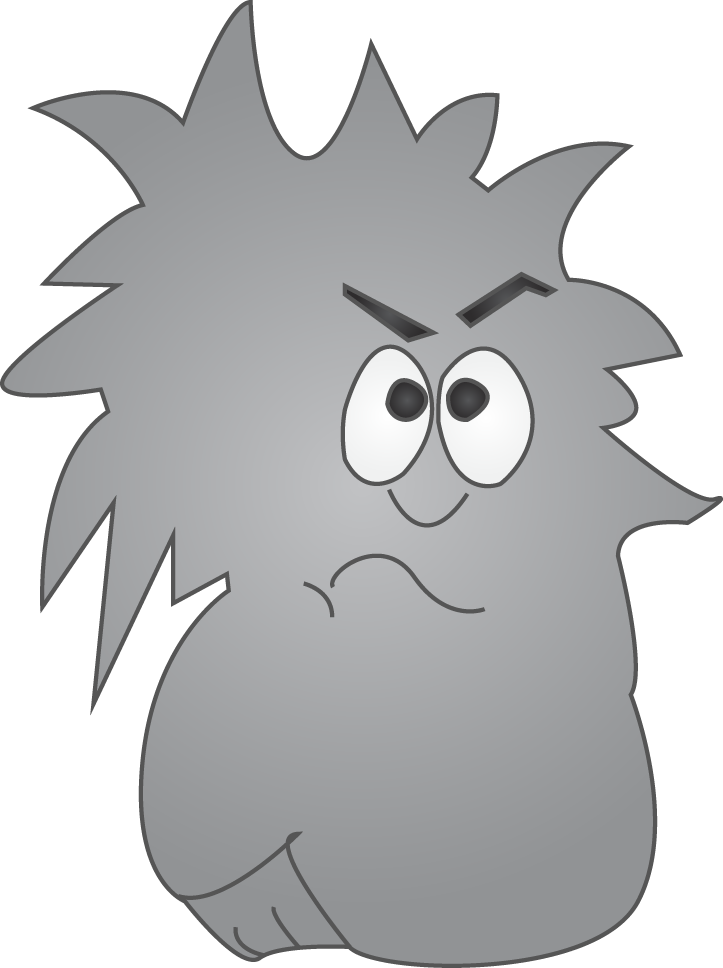
Name-Calling
People sometimes call each other unkind and unfair names. We’re more likely to do so when we don’t feel good about ourselves. We name-call to pretend we’re better than another. Such pretending is an unfortunate way to try to feel we’re good enough.
Name-calling is always not nice. Whenever we do it, we give ourselves a reason to like ourselves less. When we do it a lot, we give our wobster reasons to worry that we’re not being a nice person. So, anytime we name-call, we’re not taking good care of our mind.
Getting Put Down
The bad news is putdowns are common. People put each other down at home, school, playgrounds and workplaces. Even relatives and friends sometimes put each other down.
The good news is getting put down doesn’t have to hurt very much or at all. You can lessen or prevent hurt after being put down by knowing you strive to be nice.
Getting put down by a friend usually hurts. That’s because you don’t feel as close to her or him. But for such a putdown to hurt a lot, you must let it matter a lot. It won’t matter a lot if you’ve made being nice what’s most important. People striving to be nice know they deserve to feel good about themselves!

Being Happy
People can seem to be happy when they’re not nice. They may smile and laugh when they’re unkind or unfair. They may even say not being nice is OK.
We’re never truly happy when we’re not nice. That’s because we know not being nice to others is a reason to like ourselves less. We also know it gives others a reason not to be nice to us. Knowing these things causes our wobster to worry and wobble a lot.
To be happy, we must make sure our wobster doesnt worry and wobble too much. We can do this by staying nice. Seeing ourselves be nice lets us like and respect ourselves.
Eating, Exercising and Sleeping
Along with giving and getting niceness, there are other good ways to take care of your mind. Eating good food and exercising often are also good for your mind. So, avoid junk food and stay active.
Another good way to take care of your mind is to get enough sleep. That means have a routine time to go to bed and to get up. Starting a night’s rest by listening to relaxing music is also often helpful.
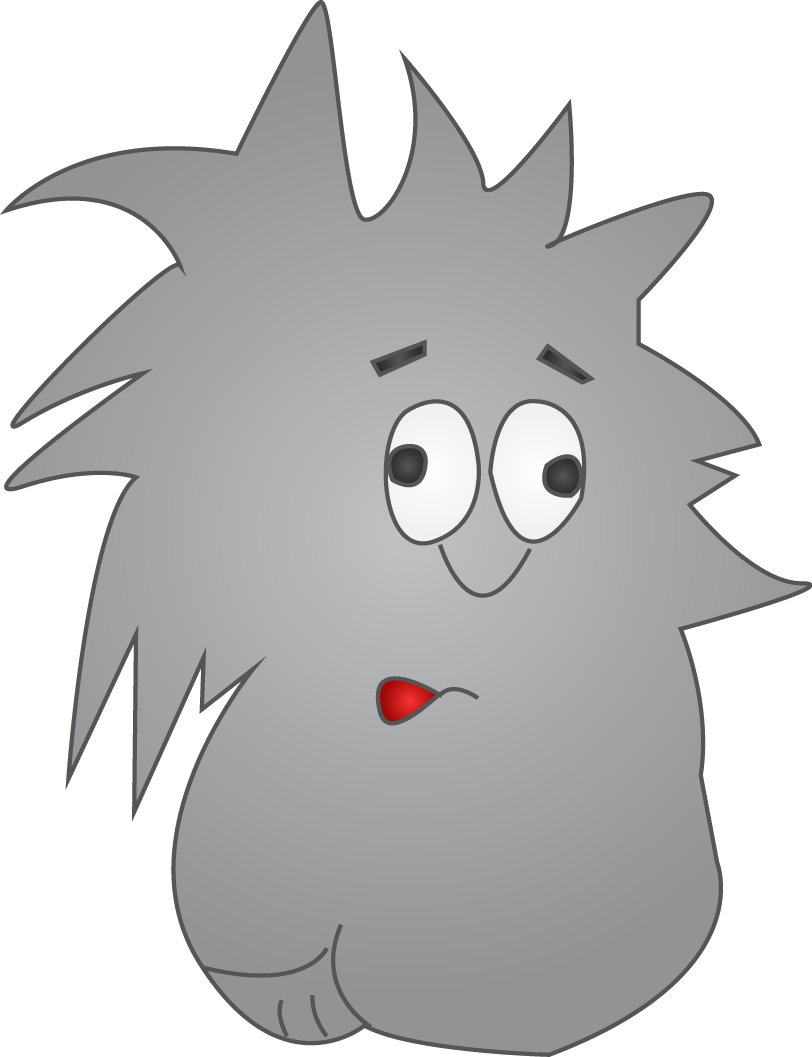
Being Humble Helps
People are humble when they realize they have hurt to heal and when they accept they’re sometimes not nice to others or themselves. Doing these things makes us more likely to heal our hurt and to become nicer.
Try being humble while answering the questions that follow the next time you’re hurt, sad or angry. Answering them honestly will help you replace a loss and heal hurt.
1. Did I lose feeling close and/or able? If so,
how?
2. Did I lose feeling safe? If so, how?
3. Did I lose feeling good about myself? If so, how?
4. Do I want someone or something too much?
5. Have I been unkind and/or unfair? If so, how
can I become nicer?
You Decide
No one can stop worrying, but everyone can learn to worry a little rather than a lot. Such learning is a big deal! It happens when people decide to stick with taking good care of their mind.
Which one of the following is the best way to take care of your mind?
Is it having a room crowded with toys,
a closet crammed with clothes,
a wall covered with diplomas,
a chest packed with jewels,
a vault stuffed with money,
a shelf jammed with trophies,
or a mind ready with niceness?
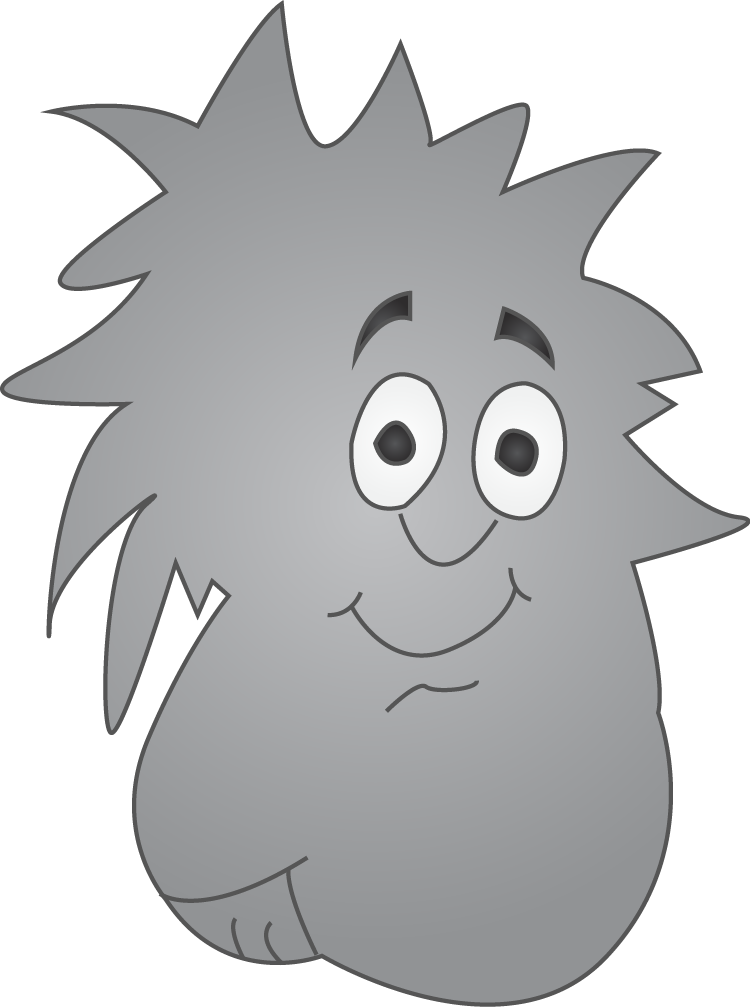
Thanks for learning about caring for your mind. People willing to learn about it become nicer and happier. They make the world a better place. Keep in mind that this book helps most when reviewed from time to time.
The Wobster Quiz
Write down whether each of the 10 items that follow is true or false. Answers follow the quiz.